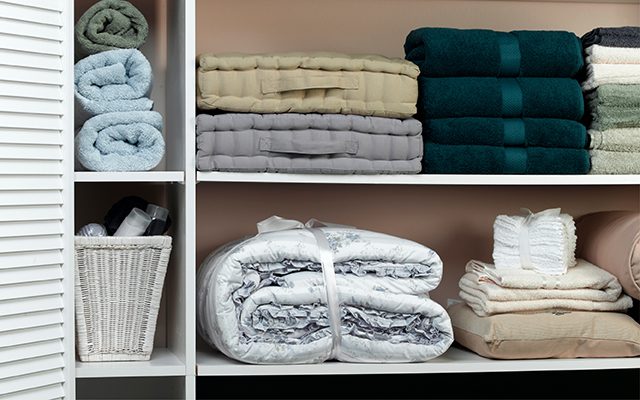Spring is a hopeful time of year, a time when many of us get motivated to clear out our bodies, lighten up our diets and drop the extra pounds we picked up over winter. Our bodies tell us they want to get moving, get into shape, jump into something new.
Our homes and offices may be crying out for a similar kind of clearing. Between the influences of the post-holiday catch-up season and our harried preparations for tax day, our spaces may be feeling dragged down, piled up or just plain stuffed to the gills. And that can make us feel less inspired than we’d like.
Spring-cleaning of any kind generally turns out to be an energizing and stress-relieving boon. Yet, feng shui tells us that clearing clutter — particularly from our surface areas — serves another important purpose: It can help us clarify our vision for the future.
This makes good logical sense: When our spaces are cluttered and disorganized, it may be hard for us to imagine taking on even one more thing. Visually, everywhere we look, we keep getting the cue that there’s no room to put — or even imagine putting — anything else on our plate.
More specifically, when our surfaces are filled with clutter, there’s nowhere to begin the practical planning and organizing tasks that typically accompany the preparatory work for new projects and dreams.
Take a look around your own home or office. Do you see the evidence of extra paperwork, leftover mail and other random items littering your desk, table, countertops and windowsills? How does all that stuff make you feel? If you’re like most, the answer is: “tired,” “de-energized” or “overwhelmed.” Not exactly the mood you want to be in as you contemplate future possibilities! Want to see a change? First, you’ll have to make some room.
Making Space
Feng shui is an ancient art of placement that originated in Asia and is now becoming increasingly popular in the West. Its philosophy is based on the premise that our lives are affected, for better or for worse, by the nature and arrangement of our physical space.
Feng shui teaches us that our space reflects our life, and that our space can powerfully support our goals, if it’s set up with that in mind. In other words, as your house (or office or studio) goes, so goes your life experience.
I have seen remarkable circumstances and situations unfold as individuals discover just how directly the condition of their lives is mirrored by the condition of their spaces. And in my work as a feng shui consultant, I’ve become convinced that clutter is one of the biggest issues in a great many people’s lives.
We have more expendable income and more opportunities to buy what we consider to be important and life-changing items, as well as more fun, interesting and timesaving items. We’re getting more mail, more email, more phone calls than ever. We’ve learned to multitask while on the phone, driving and at the office.
Our vision gets hampered by all that we own and all that we have to do. As a result of all this constant input, interruption and interference, it’s easy to lose sight of the big picture. When our attention is constantly being diverted, whether by mental or physical clutter, it’s easy for our latest goal or priority to keep getting lost in the shuffle.
That’s why having surfaces too full of stuff makes it hard to solidify any kind of future vision. There’s literally no clear space to imagine or manifest anything new.
So whenever I hear someone talking about losing their creativity or their vision, I focus on their horizontal surfaces. First, I look to see what and how much is stacked in certain strategic places, because once we lose the ability to see the top of our desk, or the top of a table or a counter, our ability to hold onto any kind of vision is undermined. Clutter ceases to be a mere annoyance, and instead becomes a serious obstacle to moving forward.
If career vision or creativity at work is an issue, then looking at the desk is an obvious first step. It’s easy for things to get piled here because during the course of a normal day we don’t always have time to deal with each and every item that comes along. Piece by piece, the things we placed on our desk as reminders get piled one on top of the other. Sometimes coworkers give us little gifts or awards that we feel obligated to display. Eventually, there’s no room to work at the desk, so we might have to work somewhere else, or work on top of our piles.
Regardless of how the clutter gets there, one thing is certain: As the horizontal space gets diminished, so does our vision. To illustrate, I’ll share a couple of real-life examples from my practice.
Paper Trail
A woman named Anne hired me to come to her office, one of many in a building that housed the large publishing company for which she worked. She called me because she felt stuck and bored at work. When I saw her office, I understood why. There were stacks of paper, files, magazines, proposals, etc., on every horizontal surface. Her desk, credenza, some extra chairs, the top of the file cabinets and the floor were filled, leaving only a small path to her office chair.
It goes without saying that she was overwhelmed. I knew that instructing Anne to spend her next free weekend cleaning up her office would have been met with a lot of resistance. Instead, I suggested she spend the last 10 minutes of her day, every day, doing something to clean off her desk. It didn’t matter if one piece of paper got moved, or a whole stack. The important part of this exercise was for her to start a new habit of keeping her space under control.
Initially, Anne admitted she couldn’t imagine how doing such a small thing would make any difference. She was looking for a whole new life vision; she was looking to ignite some long-lost creativity. Moving these little pieces of paper seemed so insignificant. Yet, within a few days of taking some small steps, Anne began to notice a difference.
The real impact hit her about the fifth day, when she made her publisher’s deadline — for the first time ever. She explained to me it was as though she suddenly had more time in her day.
A week later, she proposed a new management idea to her boss who not only found it workable, but re-routed some of the mundane and downright annoying parts of Anne’s job to someone else. Anne’s job suddenly got easier and more fun.
It was then that Anne decided to begin paying more attention to her office feng shui. The more physical space she uncovered in her office, the more changes she saw relating to her job. After she had finished clearing the desk, she slowly but steadily dealt with all the loose ends around the office.
Recently when I returned to see her, there was a place for me to sit, room to comfortably walk around, some additional storage, and her desk was cleared off, ready for new, expansive ideas. And Anne was feeling much happier at her job.
A Seat at the Table
Jerry was a single man disgruntled about how his life was playing out. He felt like he was in a dead-end job and a dead-end relationship. As we walked around his condo, it became evident to me that his dining-room table was hub central — not a place for relaxed dinners or intimate conversation.
Jerry confirmed that was the case. The table was where he paid bills, stored the mail, the newspapers, did his taxes, set up his laptop. In fact, he did just about everything there but eat. Eating was something he did on a TV tray in front of the television.
Just like Anne, Jerry was not convinced that simply redirecting some of these activities to more appropriate places would turn his life around. But based on his goals, I urged him to reconnect with his table and eat there, creating a habit of nourishing himself physically so he could nourish himself emotionally and mentally as well.
Jerry was more impetuous than Anne, plus there was less clutter to deal with, so within a couple hours he had cleared off the table. He admitted that for the first few days, it felt good to have the table clear and open. A few flowers added a nice touch. But little by little, things started to reappear: the day’s mail, then the newspaper, then a few coupons. Before he knew it, the table was back to the way it had been.
So Jerry cleared it again. This time he bought himself a small desk where he could store and pay bills and which would provide a more appropriate space for his laptop. Still, it took a while before he actually ate a meal at the table.
He explained that most of the time he felt his loneliest when eating by himself, so the television was a good distraction. But he admitted it was while eating at the dining-room table one night that he got clear about both his job and his relationship.
The next day he started looking for another position and ended his relationship. Within a month he started a new job that used his skills in a more productive way, and that offered a larger salary. Suddenly, Jerry felt far more confident and more in control of both his personal and professional destiny.
Although both Anne and Jerry are examples of people who saw fairly dramatic results from making small changes, feng shui often works in subtle ways. The results may come tiptoeing in softly and unexpectedly. But you will almost certainly notice that opening up the physical space of your office or your home and allowing surfaces to be clear can bring about a great deal of clarity and freshness to your life.
Even a single square foot of open surface area may be enough to trigger a vision for a positive change you might not otherwise have considered. Sometimes even the smallest attempts at clarity can bring about the biggest rewards.
7 Tips for Eliminating Clutter
-
- Take 10 minutes a day to manage the stacks of files, papers and books on your desk. You may discover the time and energy you need to spark new ideas at work.
- Clear off every last item on the fireplace mantel (or another small but cluttered surface) so your eyes get used to empty space. After a week or two, replace only a couple of the items you absolutely love.
- Keep your nightstand clear of extraneous things so you can retire with a clear mind and enjoy nighttime dreams that are creative and free.
- Start a daily kitchen “shut down” ritual where you put away all food and dishes, wipe counters, replace dirty dish towels and so on. Allow your kitchen counters to breathe in health and well-being by keeping them as clear as possible when not in use.
- Remember that your dining-room table is a space for community, connection, nourishment and pleasure. Be careful it doesn’t get piled with mail, newspapers and miscellaneous items.
- Identify whether there might be emotional reasons for your clutter. Are there areas where you are trying to create “coziness” or a protection buffer by keeping stuff piled up around you? Are you memorializing the past in favor of creating a new future? Are you trying to avoid facing an uncomfortable reality that might become clear if that cluttered space were suddenly empty?
- If you are overwhelmed by the idea of even starting to declutter on your own, enlist a friend or professional to help you make decisions about what to keep or toss. Find a consultant through www.fengshuidirectory.
Carole J. Hyder is the author of Living Feng Shui: Personal Stories and Wind and Water: Your Personal Feng Shui Journey. She lives in Minneapolis. This article originally appeared at “Clear a Surface, Clear Your Vision” in the May 2005 issue of Experience Life.




This Post Has 0 Comments